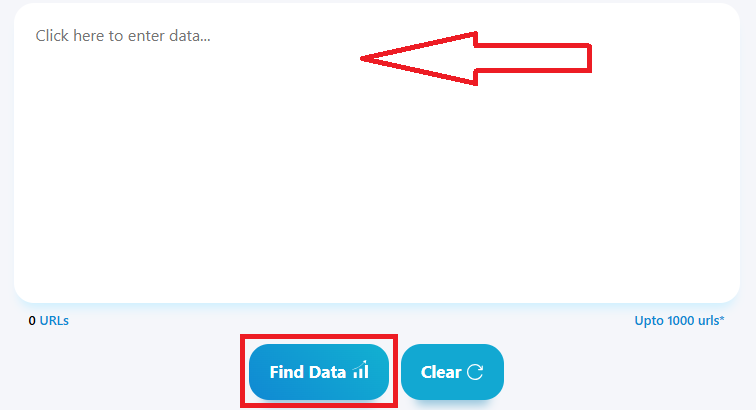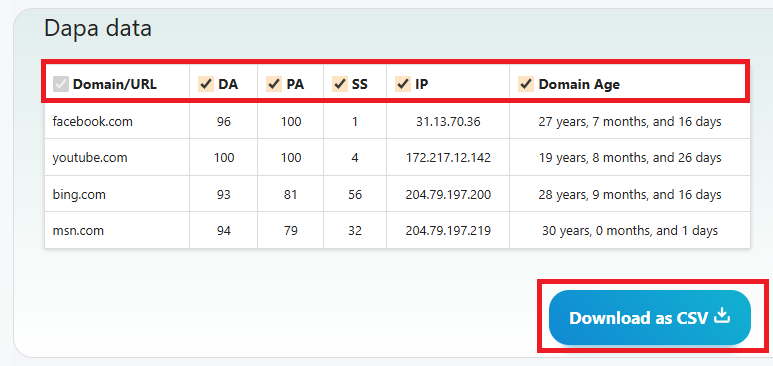DA PA Checker (Domain Authority Checker)
To Use Dapacheckerpro, Paste upto 1000 URLs in the input box given below and click on Find Data Button.
✨ PREMIUM PLAN ✨
$11.99

TRC20 ( USDT )
11.99 $
You can pay using Bitcoin, Ethereum, BNB, and other supported coins.
PaidIf you need any help, please Contact us
✨ Now You Can Use ✨
Premium
| ▲▼ | ▲▼ | ▲▼ | ▲▼ | ▲▼ | |||
|---|---|---|---|---|---|---|---|
| Domain/URL | DA | PA | SS | Linking Domains | Inbound Links | IP | Domain Age |
Free Domain Authority Checker: A Comprehensive Guide to Understanding, Using, and Improving Your Website’s DA and PA
Understanding domain authority is key for anyone looking to improve a website’s visibility on search engines SERPs. This article dives deep into what DA and PA mean, why they matter.
1. How to Use the Free DA PA Checker
Our free DA PA Checker is a powerful tool for digital marketers, SEO professionals, and webmasters looking to track the authority of their websites. Here’s how to use it effectively:
Step-by-Step Guide
- Enter URLs: Copy and paste up to 50 URLs into the input box.
- Run the Checker: Click on “Find Data” button to start the analysis.
Analyze Results: The tool will provide a detailed report with essential metrics such as Domain Authority (DA), Page Authority (PA), Spam Score (SS), Domain Age, and IP address.
Download Your Report: Click on “Download Excel” button to save the results for easy offline analysis and record-keeping.
By following these simple steps, you can quickly check and compare the authority of your domain and pages in seconds.
3. Key Features of the Bulk DA PA Checker Tool
Our DA PA Checker is built with the latest Moz APIs, ensuring accurate and up-to-date metrics. Here are some notable features that make it a standout tool for SEO:
- User-Friendly Interface: The tool’s design is straightforward, making it easy for beginners to navigate and get results with a single click.
- Accurate Metrics from Moz API: Since our DA PA Checker relies on the Moz Premium API, it delivers precise DA and PA scores along with additional metrics like Spam Score, Domain Age, and IP address..
- Bulk DA PA Checking: The free version supports up to 50 URLs at a time, ideal for small websites or beginners. The premium version, however, allows for bulk checking of up to 1000 URLs, making it perfect for agencies or large websites.
- Extra SEO Metrics: Beyond DA and PA, the tool also provides Domain Age, and IP address, and spam scores. These extra metrics offer a well-rounded view of your website’s performance and health.
- Downloadable Reports: You can download your results as an Excel file, enabling easier tracking over time and comparison with competitor sites.
4. What are Domain Authority (DA) and Page Authority (PA)?
Domain Authority (DA) and Page Authority (PA) are scoring metrics developed by Moz, designed to predict how well a website or a specific page will rank on search engine result pages (SERPs).
- Domain Authority (DA): Scored from 1 to 100, DA reflects the potential ranking ability of an entire domain.
Factors: Domain age, backlink profile, and link quality influence this score.
- Page Authority (PA): Similar to DA, PA measures the ranking potential of individual pages on a domain. Scores also ranging from 1 to 100.
Important Note: Google does not use DA or PA as a ranking factor, meaning these scores don’t directly impact SEO. However, DA and PA offer a valuable look into your site’s link profile and ranking potential relative to competitors, helping you set realistic SEO goals.
5. How to Understand and Use DA and PA Scores
Knowing your DA and PA scores is a good start, but understanding how to leverage them in an SEO strategy is essential. Here are practical ways to use your results:
- Competitor Analysis: Compare your DA and PA scores with those of top competitors to gauge where your website stands within your niche. Aim to build a higher score than the websites you’re directly competing against.
- SEO Goal Setting: DA and PA can help you set realistic SEO targets. If your competitors have high DA scores, so focusing on improving your backlink quality to slowly increase your DA over the time.
- Link-Building Focus: Higher DA scores are typically associated with a strong link profile. Keep in mind that natural, high-quality links are more beneficial than paid or spammy links, which can harm your score.
- Content Improvement: Pages with low PA scores might need a refresh in terms of content quality or keyword targeting. Improve on-page SEO elements like keyword density, meta descriptions, and internal linking to increase individual page authority.
6. Tips to Improve Domain Authority
Improving DA isn’t a quick fix, but here are strategies to gradually build your score:
- Earn Quality Backlinks: Links from high-authority sites can significantly impact your DA. Focus on creating valuable content that attracts organic backlinks or consider reaching out to relevant sites for guest posting.
- Learn more about quality backlinks from Google’s link-building guidelines
.
- Learn more about quality backlinks from Google’s link-building guidelines
- Remove Spammy Links: Low-quality or spammy links can hurt your DA. Regularly audit your link profile and disavow harmful backlinks to maintain a healthy SEO profile.
- For a guide on disavowing harmful links, see Google’s Disavow Links Tool
.
- For a guide on disavowing harmful links, see Google’s Disavow Links Tool
- Increase Traffic-Driving Links: Links from sites with high traffic and authority provide valuable “link equity.” The more reputable sites that link to your site, the better your chances of increasing DA over time.
- Enhance Site Content and UX: Great content encourages user engagement and shares, which can lead to more backlinks. Also, a site with good UX signals (e.g., fast loading speed, mobile-friendliness) often attracts higher-quality traffic, which indirectly supports DA growth.
7. Frequently Asked Questions (FAQs) about Domain Authority
Q: Is Domain Authority a Google Ranking Factor?
No, Google does not use domain authority in its ranking algorithm. DA is a Moz-specific metric that correlates with ranking potential, but it’s not a direct ranking factor. Instead, it serves as a useful benchmark for SEO planning and competitor comparison.
Q: What Is a Good DA Score?
A “good” DA score is relative to your industry and competitors. Typically, DA scores above 60 are considered strong, while scores between 50 and 60 are good. It’s essential to compare your DA with competitors in the same field rather than aiming for an arbitrary number.
Q: Can a Low DA Score Improve with SEO?
Yes, you can improve a low DA score through quality link-building, on-page SEO, and removing harmful backlinks. However, improving DA takes time and consistent effort in optimizing your website.
Q: How Often Should I Check DA and PA?
Check your DA and PA scores monthly or quarterly to track progress. Monitoring your scores regularly allows you to adjust your SEO strategy if you notice any drops in authority.
8. Final Thoughts on Using the DA PA Checker Tool
Our free DA PA Checker provides a robust and accessible way to evaluate your website’s domain and page authority in seconds. By utilizing the Moz Premium API, this tool ensures reliable metrics, helping you make data-driven decisions in your SEO efforts. Remember, DA and PA are not absolute indicators of SEO success, but they offer valuable insights that can guide your optimization efforts.
To maximize the benefits:
- Use the tool for competitor analysis.
- Track DA and PA scores over time to measure the impact of your SEO efforts.
- Focus on building a high-quality link profile and continually improving your website’s content and user experience.
Whether you’re an experienced SEO professional or new to digital marketing, understanding and leveraging domain authority can provide a competitive edge.



